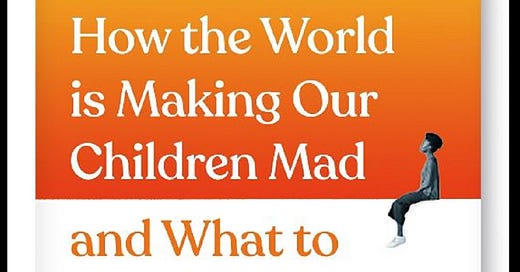Book Review: “How the World is Making Our Children Mad, and What to Do About It: A field guide to raising empowered children and growing a more beautiful world"
Author: Louis Weinstock
If you are a:
parent wanting your children to be able to live their best lives,
teacher wanting to give your pupils the best of starts in life
paediatrician wanting to optimize the psychological health of your patients;
human being wanting to create the best world for the flourishing of all our children,
then, simply put, this is the book for you.
And if we were all to come together and start teaching the kids themselves the pragmatic, empowering concepts in this book, and through this knowledge of themselves, allow them also hold us to account, I truly believe that what the author has to teach us, adults and kids alike, has the potential to transform the whole world for the better.
This is a book about uncomfortable truths. The uncomfortable truth that children mimic, absorb, take their cues and learn from, and reflect our adult nervous system responses and behaviours. Precisely because kids so strongly reflect our ways of being in, and attending to, the world, we can choose to show them either a wonderland through the looking glass, or the view into a mirror darkly.
Indeed, according to the author, the most uncomfortable truth of all is that when we suppress our own uncomfortable truths, when we don’t attend to our shadow, when we neglect our own inner child, this is reflected in the nervous systems and hence behaviours of the children in our care.
“Do as I say, not as I do” never worked for raising kids, and this book explains why it never will.
At its heart, what Louis teaches us is that, as their innate protectors, heroes/heroines, and role models, children are constantly consciously and unconsciously scanning us for the answer to the question “am I safe?”. Not “safe” as in “health & safety” culture or as in “safetyism” (indeed, Louis has much to say about the negative impacts of “helicopter parenting”), but safe at the visceral, life and death, nervous system levels.
Louis’s conclusion is that much of what is labelled “bad behaviour” in children is actually a dark reflection of our own inability to feel safe in the world or to regulate our own nervous systems in their presence.
Louis is a very experienced and acclaimed psychotherapist, and brings life to what he has learned over many years of working principally with children and families, with very well written verve and a compelling narrative, humour, humbleness and humility, while at the same time not shying away the inherent darkness of the subject matter and the challenging material. The story is illustrated by his own real world cases of his clientele, and his own real life successes and, at times, brutally honest, failures as a father to a young daughter.
Unlike many other books on this type of subject matter, which just bemoan the state of the world, and the impacts the modern world is having on our kids without any real answers, the focus of this book is squarely on the pragmatic and actionable solutions, and the text is frequently interspersed with exercises and toolkits for addressing all the issues, which can often be done with children too. Indeed, the book identifies seven root causes of bad outcomes for children, and provides the pragmatic antidotes to each of these.
Here are a couple of excepts which I feel help summarize the book in the Louis’s own words:
“Like the red-faced, stressed-out teacher who shouts at the children in his class to ‘calm down!’, it doesn’t work when we try to impose on our children something we haven’t already accessed within ourselves.”
“It’s really important to say that there is no blame here. None of this is your fault. But once you begin to see these patterns and how they play out in your own life, it is your responsibility to do something about it."
“When parents work on this stuff, face and heal their shadows, whatever problems their children are having dissolve. And parents and their children become less vulnerable to some of these shadowy patterns in the world, too. All it takes, at this point, is to be open to this.”
Further reading - articles by Louis:
Children Can’t Avoid Viral Stories About War and Climate Crisis – but we can help them, in The Guardian;
Protecting Your Kids from Social Media Harm - A Guide for Parents, blog post;
Their Brains Are Not Broken, in MAD in the UK;





Before my children reached adolescence, I decided that I needed to treat them as adults. This basically meant two things. I asked their opinion about a lot of things. And, I stopped answering questions, and in return, asked questions to help them think for themselves. The problem with this strategy is that many parents don’t know how to think for themselves. As a result, they project their own inner conflicts on to their children. I spend a lot of time talking with Millennials and GenZers. See in child rearing and parenting styles over a long time, I’d say the essential problem is a lack of situational awareness which leads poor development of self-awareness. I’m passing your post along to my children who are at child rearing age.
Most adults interfer with and inhibit young people's thinking. I let everyone young person know I am not smarter because I am an adult. I might have more experience and more information, it dosen't mean I am more intelligent. We function in the same way and on the same wave length once one got past or took into account the smaller amount of information available to the very young person and the restricted amount of free attention immediately available to the elders.